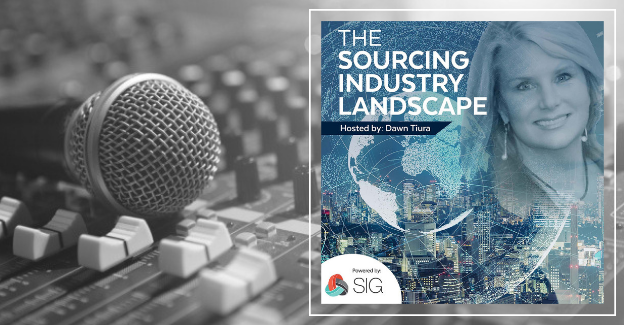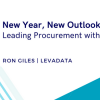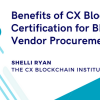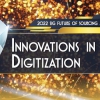In this episode of the Sourcing Industry Landscape, Dawn Tiura interviews Antonio Humphreys. Antonio Humphreys is the Senior Manager, Global Procure to Pay at Adobe. His diversified career path took him into roles outside of his wheelhouse, which has allowed him to excel at Adobe within the marketing sourcing vertical.
Dawn Tiura: Folks. I am so excited to welcome to the studio today, Antonio Humphreys. He's the senior manager of Global Procure to Pay at Adobe, but that doesn't even begin to tell you about really the man, the legend, Antonio. He is a dear friend to SIG. He's a wonderful mentor and he's so knowledgeable and so giving of his time and his availability and to help other people out. So Antonio, thank you for joining me today,
Antonio Humphreys: Dawn, thank you as well. You're just as much a legend in the industry and everybody looks up to you and very much appreciate this opportunity.
Dawn Tiura: Well, thank you. So Antonio, you didn't immediately start out in sourcing and procurement. I mean, you had a different path so can you tell me a little bit about the earlier years and what you did and why you got into sourcing and procurement in the first place?
Antonio Humphreys: Sure. So, really got exposed to sourcing and procurement believe it or not, working for the government, in Air Force specifically and then earlier on, after that with NASA in Houston for Johnson Space Center. So really caught the bug there, really kind of understanding a little bit of everything that has to happen for a lot of military-specific projects and obviously the Space Shuttle Program, which is just a really, really fun experience. Beyond that, then I said, "Hey, I probably need to get a little bit more diversified," and I tried my hand in some sales and marketing, consulting specifically with Shell Oil and I wanted to get a feel outside of government so I kind of went down the oil and gas vertical and then I said, "Let me switch over to tech," specifically more on the hardware side with Compaq and then eventually through HP, which led me to the Bay Area, which I said, "Hey, let me switch gears to retail."
Antonio Humphreys: Then I tried my hand at Gap Inc., did a lot of fun stuff there, different sourcing verticals in addition to more regional accountability with EMEA and APAC and then switched back to technology with Adobe, where I am now, just doing a lot of fun stuff specifically a lot on the sourcing side, operations and both from a domestic and international perspective. So interesting journey.
Dawn Tiura: That is interesting, to think that you would have gone from Compaq and HP to Gap Inc. I mean, that had to be a heck of a transition completely and totally different to go into retail and fashion and things like that. So was that a shocker, or was that a good transition to help mold your skillsets?
Antonio Humphreys: Yeah, I wouldn't say... Not necessarily a shocker, but definitely different. When you look at hardware components in the supply chain that's involved from that perspective, they vary big, big. At the time, HP was the largest IT company in the world—150,000 plus employees—just incredible amount of M and A activity and just a ton of really progressive work that was being done. But when I looked at it, just saw it as an opportunity just to do something different and I think that's some of the things that I tell a lot of my mentees and folks that I work with is, don't be afraid. Don't be afraid to make that leap if you're going into a direction that could be something totally different. That's always an opportunity to learn and sometimes if you fail, that's always a learning point, and that's something that I think is very important for all of us out there in the industry.
Dawn Tiura: It is. Hey, so sort of a side note, back in the early '90s when I was still practicing as a CPA in Palo Alto, I actually did the Hewlett and Packard's personal tax returns and their foundations.
Antonio Humphreys: That is incredible, I had no idea, but just another thing to notch up on your wall.
Dawn Tiura: Yeah, it just occurred to me, I'm looking at like Hewlett-Packard's like wow, that's a blast from my past as well because I was right up the street and I was president of the Palo Alto Chamber of Commerce and actively involved with a lot of then startups and early stage companies. So, it was actually... I was a CPA back then before they had named it Silicon Valley and I was actually on a board to attract businesses to Silicon Valley. So yeah, blast from the past. So, we were really close but a decade apart.
Antonio Humphreys: There you go, outstanding.
Dawn Tiura: That's amazing. So everyone talks about you as being a mentor and giving back and you're never one to turn down a request by anyone. Tell me, how does that motivate you and why are you motivated to be so giving within the industry?
Antonio Humphreys: There's a lot of things that you kind of get your motivations from. With me personally, a lot of it is just obviously some of the things you do within your career, some of those experiences that I mentioned, kind of making those calculated moves, but the bigger return for me is really giving back to those that are coming up either within the industry, or folks that are on my teams across the globe. That is the true, true return on investment, that I really like to give back. So there's a lot of critical initiatives, whether it's board activities through the University of New Mexico, where I did my undergrad, whether it's SIG University, which I'm very, very much passionate about. A lot of things, great things that we're doing there, and with a lot of any other kind of varied mentorship opportunities.
Antonio Humphreys: I know I do a lot with the ANA, Association of National Advertisers. I've been working with them for quite a few years and it's just, I think, an incredible opportunity to do that. Not only within the sourcing side of things, but I know even from a diversity inclusion perspective, I've done a lot of that throughout my career, specifically with a lot of Hispanic and Latino up and coming employees and students and it's just been incredible. So that's definitely where my passion lies.
Dawn Tiura: Well, it sure must be because I've always heard of... And everyone just speaks so highly of you and your ability to mentor and your willingness to take that on. So that says a lot. Now you've worked across EMEA; you've lived over in Europe for at least a period of time from Gap and elsewhere. So tell me, what was it like and how do you compare and contrast working in the United States versus EMEA and UK?
Antonio Humphreys: Yeah, so I was in London when I was working for Gap, on my secondment out there, and specifically responsible for all of EMA sourcing across the board. Incredible opportunity and that's something I've always told anybody. If you get that opportunity, don't even think twice, just go for it, make that leap. The differences, quite a few. One thing that I wasn't expecting was really the timeframe, I think, to kind of influence within the teams and really be a up and comer within and making a lot of the decisions and kind of influencing, I was expecting to do that much, much more quickly but a lot of things I realized is you really have to build those relationships and make that investment of time. So you have to do that and not only with the teams there, with the supply base, with the leadership, they have to build a comfort level with you, before you really earn that seat at the table. So, that's my biggest learning, and then kind of recommendation and advice to anybody is really make your heavy investment on those things, but also just go for it. It's such an incredible opportunity.
Antonio Humphreys: You learn so much from a lot of the different varied cultures and in my case it was everything from our French operations, our Italian operations, throughout the whole of the UK, you know, Republic of Ireland—and every place is different. Yes, there's some commonalities, but you really have to respect those differences, really try and get as much along as you can from a language perspective really. Those cultural nuances are very, very important again, to establishing that rapport and from there just go for it. Be a sponge, learn as much as possible and do everything you can to help the business and learn within all of those cultures.
Dawn Tiura: That's great. So now, at your current role, you have got an incredible spend, you lead all the marketing, sourcing vertical and indirect spend including advertising, creative media, digital, social, events, research, PR, sports, sponsorships, beyond the other things that you do. That takes a special talent as well. Is it your undergrad in marketing, or is it your ability to just relate to people that has made you successful? Because most people hate this category and you have just rocked it. So why is that?
Antonio Humphreys: Yeah, no, I think it's one of those areas where it is just so diverse. All of those things that you mentioned, there's so many what you call like subcategories, that can be pretty complex and just very demanding. It's not an easy area to manage. Lots of great personalities, that you're working with and managing all across the globe and again, everybody has their own personal touch of how they want to influence these. So yes, my marketing background definitely helps. I even worked at an advertising agency for a little while for no pay, which was a lot of fun but incredibly enriching. You understand what it takes to be part of an account team. You understand what are all of the influences that go into developing an ad campaign; all the content creation that goes into it; all the localization and all those pieces.
Antonio Humphreys: So yes, that background is very helpful but then beyond that, it's just really diving in, understanding all the business priorities and all the fire drills that have to be managed just because that's the nature of the work. There's a lot of pressures on a lot of those corporate marketing teams to support all the different business units and if they get any sort of investment from them, they're saying, "Hey look, there's got to be a good, tangible ROI for a particular campaign." Or some media buys or any sort of localized campaign, in any market across the world, there's a lot of work that has to go into it and typically there's not a lot of time to do it. So it's understanding the pressure points, understanding how to support in a timely way and just roll with it and have fun. It's a fun, fun space.
Dawn Tiura: It is a fun space, but most people in, at least with my experience back in my consulting years, is they don't respect sourcing because sourcing doesn't understand marketing and that it's so creative and typically the sourcing people aren't as creative, that there's been a pushback on us ever understanding. So is it changing the language? Obviously, you want to save money, but also how do you let them know that by saving money doesn't mean that you're going to reduce their budgets, but maybe it means they can run more campaigns. How do you get a seat at the table to really discuss this with them? What's your approach?
Antonio Humphreys: That's spot on. Everything that you just said is really my approach and my team's approach and that's really what you have to do I think, when any conversation, any company that you're in, it's really that. If you're thinking about budgets and pure cost-cutting, that's just going to get you kicked out the door versus a seat at the table. It really has to be about, what are the things that you're finding that incremental value in the conversation basically to help just get the job done. It doesn't necessarily have to be about cost savings.
Antonio Humphreys: If there is something that kind of comes from that and if you're doing the appropriate should cost analysis and the should cost benchmarking, great. We know that you've done your job to make sure that you're paying the appropriate market rates, but if there's an extra expectation for a vast amount of cost savings, that's typically not the recipe for success, I think, on the marketing and sales and sponsorship side, you really want to maximize those dollars so that you can say yes, you were able to prove, X percentage of ROI from that investment to make sure that you're driving the most top line and ultimately bottom line as well.
Dawn Tiura: So if someone was new in getting into this category and they've been sourcing widgets before, what would you tell them, where would you go to get educated? Should they take a stint and work in an advertising agency? How would you coach somebody in this role?
Antonio Humphreys: Yeah, no I think that's a really good idea. When you look at some of the rotational ideas that I've seen out there in the industry, I think that's a really good one. You can look at specifically, at an ad agency, or just within the marketing business as a whole. I think there's a lot of great things that you can come from shadowing different individuals and understanding just basically the nuances of how that works.
Antonio Humphreys: The other thing is, I mean, just learn. Talk to your business partners. Be on top of a lot of the main industry publications that are out there. Again, I mentioned the ANA, Association of National Advertisers. They're one of the bigger firms out there that help us and with a lot of things we do on the advertising and financial management side of things. So they're a key resource that I would recommend but I mean, there's a lot of great content, I know on SIG's site as well, and a few others. So, tackle a lot of the industry publications and research materials that are out there, shadow as much as you can within the business, and if you have a formal rotation program, take advantage of that for sure.
Dawn Tiura: Oh, that's a great idea. So, we're always talking about elevating the role of the CPO to be equal. So if we have the CEO in the center and the CFO on his right hand, I'd love to see the CPO at his left hand, but a lot of people aren't there yet. So what are you going to take from all of your experiences? Because I definitely see CPO as one of your next titles. What are you going to take from all of your experiences to make sure that you're elevated and you're not pushed down as just an overhead type function?
Antonio Humphreys: Well, thank you Dawn, I appreciate that. I think when you look at the role of CPO or any kind of executive leader in this function, the main thing that he or she has to be really focused on is, is how do they partner well with all of those other executives at the table? If you're looking at that board and you're figuring out, okay, we aren't just a pure overhead function and there is, obviously there's a lot of overhead that comes with what we do from a cost perspective, but there is that value-driven piece that we're always looking at, again, that should cost benchmarking, to make sure we are paying the right rates. There's always the risk mitigation piece, we're always looking at many different things in terms of what we have to do to ensure the appropriate market risks, that we're going into new areas.
Antonio Humphreys: If we're looking at M and A activity, there's a lot of input that we have there. A lot of things from tools and systems. If you're looking at a lot of emerging trends, obviously with different technology, which I know you and SIG have been very much at the forefront of educating us in the industry. We've been doing a lot around RPA, a lot of leveraging, AI, OCR recognition, et cetera. So I think that's something that's going to continue to really propel ACPO role and how any company is going to continue to evolve and be successful in the marketplace.
Dawn Tiura: Oh, I can't agree more. I cannot agree more. So, tell me, we talk a lot about third party risk, but the space you're in, you're in a very interesting... You have reputational risk right at your fingertips every day as you make decisions in the marketing, sourcing vertical. How do you protect yourself and the company from... We see ads that blow up because it wasn't vet by enough of the right people and that somebody is deeply offended and so now a company's known for all the wrong reasons. How do you protect yourself against that kind of third party risk in your category?
Antonio Humphreys: There's a lot that has to be vetted obviously in a lot of those master service agreements that are agreed to between both parties, a ton of terms that that really need to be reviewed and collectively agreed to. I think that's one, when you look at partnership with some of those other shared service departments within each of your companies, there's your compliance team, there's your audit team, there's other parts of financing and you're looking at your FP and A teams, et cetera. I think there's a lot of key partnerships that has to happen across all of those groups to make sure that we're all kind of doing our own bits and pieces to make sure that you're securing the best deal for your own company, but also a fair deal in partnership with whoever you're doing business with.
Antonio Humphreys: There's InfoSec terms, that's such a critical component, when you look at lot of what's going on in the industry, really protecting data privacy. When you're looking at obviously a lot of the trends that are being driven out of EMEA and then I think which will really expand much, much more quickly here in the States and across a APAC as well and that'll just continue. When you look at, I think, a lot of the key technology trends like I mentioned before, that that will impact. So I think it's a lot of that due diligence that has to be done upfront and of course we get knocked for that by the business because we're just not fast enough, but I think it's just that level set of expectations to say, "Look guys, we have to do this. We're protecting you, we're protecting the company and we're moving as fast as we can because we are helping with one of 10 things that we're trying to balance and do right for the company."
Dawn Tiura: Yeah, that's interesting. So people from Adobe are listening, I don't mean to infer anything, but your normal tenure's been about five years at most organizations, seven at some, you're just passing five years. So let's say five years down the road, where do you hope to be seen and where might you predict that you might be?
Antonio Humphreys: I never put a strict timeframe on any sort of kind of career progression. Adobe's an outstanding company and it's doing some, some great things. I think really when you're looking at that next career move, or what have you, it's really just looking for something that's challenging, you're able to leverage a lot of the key skillsets and abilities that you can bring to the table, like I mentioned before. So it's really just taking things to the next level. Where is it that you can gain that much more accountability, driving that much more innovation? I think really when you look at where we are right now in this industry 4.0, the fourth industrial revolution, there's just so much opportunity for us still.
Antonio Humphreys: I know whenever I do presentations I throw out, you know, the whole scary tagline of roughly half of what we do as a procurement sourcing function will be automated probably by around the year 2030. So if we're only thinking about 10 years from now, half of what we're doing now will be automated. Is that scary? Sure. Is it also an opportunity? Of course. There's a lot of things that if we're planful and strategic now to think about, where are those areas that we can make those strategic investments to make sure that we're becoming that much more efficient and optimizing those areas that are just purely tactical? Great.
Antonio Humphreys: Then where is it that myself and my teams and any sort of sourcing functions can really focus on those areas that they can double down in much more strategic areas in investment? It's just a great, great opportunity. So that's really what I look for. That is that future and then also those opportunities.
Dawn Tiura: Yeah, so you're somebody who's very open to change and you embrace it and you go after it but we probably have about a third of our industry that is tired, they're tired. They've been drinking from a fire hose. They remember back before there was email and voicemail and people were faxing and that was a big deal. Some of these people are really worn out. So how do you generate excitement for all this change? Because it's coming at us faster and faster and it's not going to stop, no matter how much people want it to, it's going to keep changing. How do you motivate your team to just embrace it and be open to it?
Antonio Humphreys: It's interesting because I do hear that as well. So there's a lot of folks that will say, "How do we actually keep pace with technology and just that kind of rapidity of what's going on out there?" I think Dawn, we just have to do it. There's one of those things that it's just... You can maybe make some choices and say, "Hey, do I want to continue to play in this space?" You know, “yes.” If you don't, there's plenty of other career opportunities out there. There's a lot of things that I think we gain in this role where you can act as internal consultants in many different capacities, like I mentioned, finance. It could be an audit or compliance and security and lots of different areas that are very, very transferrable skills on the sales side as well.
Antonio Humphreys: I think there's a lot of things that when you have as much tangible information regarding just the company spend and what's going across the different business units and things like that, you would having very, very transferable skills to go into many different areas. Now, that said, those that continue to be motivated and excited, I think those are the folks that have just a bright, bright future because the more that you're able to adapt and actually be invigorated by a lot of that change and how technology can help leverage and you're—not only what you do every day but help propel you to that next level—I think is just massively exciting and that's what I look forward to as we continue to invest in a lot of things around bot algorithms.
Antonio Humphreys: Again, a lot of things from an AI perspective, OCR technology as it going to relate to a lot of contracts, management solutions, a lot of things from ... You look at the whole procure to pay cycle it's not just sourcing, but when you look at everything from PR to PO, to accounts payable, there's a ton of opportunity there. I think even with the travel and expense auditing, I think that that's another exciting space, as any company continues to grow. When you look at some of the risks that's there, there's a ton of technology there that I think really helps propel a lot of the teams that manage that space.
Dawn Tiura: I agree. So maybe by 2030, the people who are tired of this change might have traded out of the system or found their sweet spot someplace else because if we're going to eliminate a bunch of the work, then we won't need some of those people that are not embracing the change any longer either. So maybe it might happen a little bit more naturally and organically than we expect it to.
Antonio Humphreys: I think that's a fair assessment and I don't think that's something that's going to be unique to what we do. I think that's going to be fair in other parts of typical finance roles and other shared services roles.
Dawn Tiura: Oh, absolutely.
Antonio Humphreys: I think that's the nature of evolution. So if you're thinking about this, again, this trend of the fourth industrial revolution, that there's a lot that we're going to look at in terms of just increasing levels of complexity, use of all these, cyber-physical systems that's where we need to quickly learn how to adapt, how to leverage and make sure that we're optimizing as much as possible so that we figure out, where do we fit in this new world? I think that's something that those that are excited about that challenge, will be very successful.
Dawn Tiura: Oh, I agree too. So unfortunately, Antonio, we're running out of time and I do try and keep these podcasts to consumable, like in a short drive, or a quick workout. So I want to thank you and I want to invite you back to give us an update. Can I keep that invitation open for you?
Antonio Humphreys: Outstanding. Of course, anytime. Anything for you, Dawn.
Dawn Tiura: Oh, thank you. So once again, folks, I am now wrapping up with Antonio Humphreys, senior manager, Global Procure to Pay at Adobe, and I hope to have him back on the podcast real soon. So thank you, Antonio.
Antonio Humphreys: Yeah, it was a pleasure and thank you, Dawn.
Dawn Tiura: Thank you.






